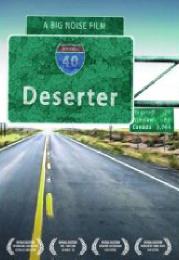Deserter
Introduction
According to icasualties.org/oif/, the US-led invasion then occupation of Iraq in 2002 has led to 4096 confirmed US deaths and reports of over 43,000 Iraqi deaths (both militia and civilian, the majority civilian). This was a war that the likes of President Bush and Donald Rumsfeld guaranteed would not take long and would bring democracy to the country, after they decided it was time to remove their former ally. His crime? For sticking up two fingers at George Bush Senior at the end of Operation Desert Storm, or the slightly more low key Operation Granby for those of us in the British armed forces during that particularly short-lived conflict.
There is no doubt a lot of people's minds that the Iraqi war is illegal, unjustified and a quagmire that both the US and UK will struggle to get out of. Intended to get rid of a dictator on the premise of aiding fabled terror organisation Al Qaeda, the Western democracies have been surprised by the indigenous population's reluctance to do things the way of their 'liberators'. This might just have something to do with the fact that we've struggled to ensure basic amenities are provided after we destroyed them or it may well just be that the Iraqi people just don't like having their country occupied.
It could also be that quite frankly we mistreat the very people whose hearts and minds we are supposed to winning. Abu Ghraib is now infamous as a prison where human rights were routinely abused, allegedly with the encouragement of the command structure. Maybe this is yet another reason why we'll never 'win' in Iraq.
US soldier Ryan Johnson decides to take a drastic course of action when he discovers that his unit is being deployed to Iraq; he and his wife Jen decide to flee to Canada, thus making Ryan a deserter. This film follows him on his trek to Canada, moving from safe house to safe house in his attempt to escape from his military duty.
Visual
Picture is a bit DIY, but adequate for the short duration of the film.
Audio
Soundtrack is in 2.0 Stereo, some subtitles within the film for phone conversations but none for the whole feature, some on the single extra.
Extras
Video conference with the subject of the documentary after the US premiere of the film,
Overall
This is a bit of a strange film for me. I served in the first Gulf conflict in the support arms, so I've never seen any 'action' so to speak, but I have very strong views on both the Iraq War and on military service, leading to conflicting emotions when watching this film.
First off, I believe that the Iraq war was both unnecessary and a complete f*ck up in both military and diplomatic terms. Washington politics, which sucked in the British political elite, have no problem with removing a dictator like Saddam Hussein that they have no problem with defeating militarily, but it sets an awkward precedent that will never be aimed at those who should naturally follow. Removal of a brutal dictator is now the justification used, but initially it was all about the potential discovery and removal of weapons of mass destruction. Strange then how the US administration is looking at the potential removal of Putin in Russia, Kim Jong-il in North Korea or the Chinese. Odd too how the British Army could be deployed to Iraq for the very same purpose retrospectively declared by Tony Blair, but nothing could be done in Zimbabwe when British citizens (albeit non-Labour voting wealthy White farmers) were losing their land and being killed.
Ok, I think I've made my self clear on that issue, but what about military service. Frankly, I'm a bit of a traditionalist here. Admittedly, the situation is possibly a little different in the US to the UK, but my view is clear of what should happen when you sign on the dotted line; you commit yourself to service to your country until the time your contract ends. No one signs without knowing that at some point you may just be asked to serve in a hostile environment or combat zone. Only a fool suggests that service of this kind is not scary, but a commitment to serve your country is just that.
In the US, the prevailing view appears to be that the US Army, and presumably the rest of the services as well, is made up of poor young men and women who struggle to find jobs and money to support themselves and their families. They see the Army as a way out of the gutter, or as near to it as they are, and the chance of better times; but the risk is always there.
People always seem to assume that soldiers in particular blindly obey the orders of their political masters and are politically naïve. The latter may be true for a lot of young soldiers (remember that the average age of soldiers serving will be between 18 and 21), but the Armed Forces are not there to decide whether a conflict is right or wrong, they are there to follow the orders of the Government of the day. Soldiers who wish to abstain from serving with their comrades do not have the civilian right to just quit a job they no longer like, they can either refuse to serve or desert. A deserter effectively goes on the run forever, a Government arrest warrant is put in place and he/she can never really live a normal life. Most soldiers look upon deserters with disgust as they believe that they have just run away. Refusing to serve at least is a protest that military personnel can understand, and even if they still don't like it they can at least someone facing up to his responsibilities and making a stand, then taking the punishment.
I understand why the likes of Ryan Johnson have deserted but can never condone it. My belief is that rather than spend his life on the run with his wife in a foreign country (albeit Canada), he should hand himself in and face the music. He'll go to jail, as he would have for a refusal to serve, and get himself a dishourable discharge but he would be free after time served. He isn't free now, unable to return to the United States and fallen out with a lot of his now estranged family. The US administration has led to many young men taking this option and they have to look themselves in the eye and ask 'why?' I think it unlikely they ever will though…
As a documentary, this film fails in my view. We never really get to see or understand the issues and the film is far too short to do this topic justice. There is a story still to be told, and Ryan Johnson is part of that story, it's just not this one. Johnson comes across as a naïve and confused young man (which he undoubtedly was) but also a little stupid. I don't mean this as harshly as it sounds, but for a man on the run, waiting until just prior to crossing the US/Canadian border to remove military stickers from his car is rather daft. He also seems a bit baffled by the reaction of his mother when he calls her from Toronto to let her know what he's done and where he is. There's a lot of awkward silence before his mother tells him that she'll just tell everyone that he has redeployed; this lie preferable to telling them her son is a deserter. I can understand both his motivations for enlisting and then for deserting, both explained very briefly in the film, but I just understand how anyone would advise him to go on the run for life rather than accept a short jail term and freedom. But then I guess war does strange things to people.



































Your Opinions and Comments
Be the first to post a comment!